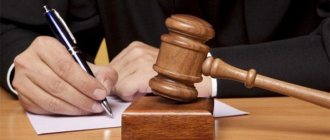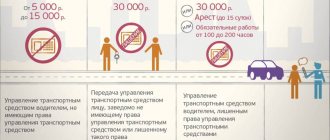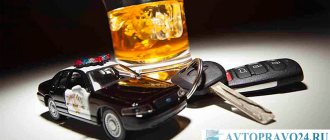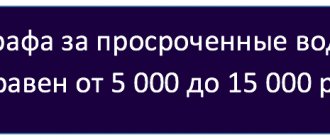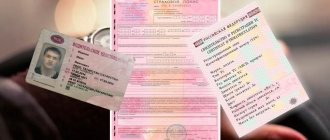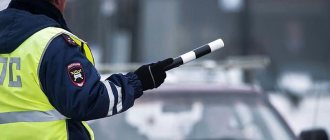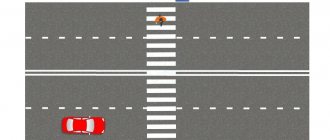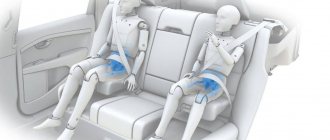Signs of drunk driving
A traffic police inspector can stop you for drunk driving, based on his observations or on a signal from other road users.
In traffic, a drunk driver is identified by inappropriate behavior:
- uncertain, unjustified maneuvers
- driving too fast or, conversely, inexplicably slow
- an attempt to “dodge” the inspector by quickly changing lanes
Upon arrest, the traffic police inspector will suspect the driver of drunk driving if:
- there is a smell of alcohol in the car (it will inevitably be there - a drunk driver drives with the windows closed)
- smell of alcohol from the driver
- on the contrary, the driver and the car smell too much of coffee or chewing gum
- the driver turns away and moves away from the inspector, breathes to the side, lights a cigarette
- the driver’s movements are sharp or, on the contrary, inhibited
- the driver's face turns red, his eyes shine, and he begins to perspire
- When asked to take a breathalyzer test, the driver reacts aggressively
Even if one of these signs is present, the traffic police inspector will begin the procedure of testing the driver for alcohol - using a breathalyzer or a medical examination.
Punishments for driving while intoxicated are regulated by Article 12.8 of the Code of Administrative Offenses of the Russian Federation https://www.zakonrf.info/koap/12.8/.
Intoxication is defined:
“the presence of absolute ethyl alcohol in a concentration exceeding the possible total measurement error, namely 0.16 milligrams per liter of exhaled air, or the presence of absolute ethyl alcohol in a concentration of 0.3 or more grams per liter of blood, or in the case of the presence of narcotic drugs or psychotropic substances in the human body.”
- The driver can refuse a breathalyzer test and a medical examination, but in this case he will by default be found guilty of drunk driving.
- The punishment for drunk driving is imposed not by the traffic police inspector, but by the court. The inspector only collects evidence and draws up a protocol.
Permissible blood alcohol limit
The driver needs to know what state is considered drunk. Some car owners are confident that after drinking 0.5 beer or 50 grams of strong alcohol, they can get behind the wheel without any problems. As practice has shown, this is a fallacy.
In order to filter out persons who have committed a violation unknowingly, since 2013 the legislator has increased the permissible share of ethyl alcohol to 0.16 mg per liter of exhaled air.
In addition to the above, the permissible threshold is established for the following reasons:
- many measuring instruments have an error within the specified range;
- alcohol itself is present in every body during metabolism, so the device will never show zero.
- There are a lot of food products that undergo natural fermentation processes, and after consuming them, the measuring device may cause false alarms.
- Don’t forget about medications that also increase blood alcohol levels.
That is why when using medications you should study their instructions. They indicate what impact is on the driver.
You should not neglect basic safety rules: do not go on a trip if you feel unwell. Call a taxi.
Amounts of fines
The amount of the fine for drunk driving is determined by Article 12.8 of the Code of Administrative Offenses of the Russian Federation https://www.zakonrf.info/koap/12.8/ and is 30,000 rubles (along with the deprivation of rights from one and a half to two years). It does not matter whether the owner of the car was driving or whether he allowed a drunk driver to drive in his presence.
But in the event of a repeated violation, criminal liability will arise, and you will have to pay up to 300,000 rubles (and this is in the best case; in the worst case, you face up to two years in prison).
How and for what they are deprived of rights
Who deprives? Only a court can deprive rights. This means that the inspector only fills out the protocol, and the judge makes the decision.
Why are they deprived? This table contains all the offenses for which a driver can be deprived of a driver’s license:
| Violation | Period of deprivation | Article of the Administrative Code |
| Got behind the wheel drunk | 1.5-2 years with a fine of 30,000 | 12.8 |
| The owner gave the car to a drunk | 1.5-2 years with a fine of 30,000 | 12.8 |
| Refused a medical test for intoxication | 1.5-2 years with a fine of 30,000 | 12.26 |
| Drank at the scene of an accident while waiting for the traffic police | 1.5-2 years with a fine of 30,000 | 12.27 |
| Left the scene of an accident | 1-1.5 years | 12.27 |
| Caused slight harm to the victim | 1-1.5 years | 12.24 |
| Caused moderate harm to the victim | 1.5-2 years | 12.24 |
| Exceeded the speed by 60-80 km/h | 4-6 months, for repeat – up to a year | 12.15 |
| Exceeded the speed limit by 80 km/h or more | 6 months, for repeat – up to a year | 12.9 |
| I ran red again | 4-6 months | 12.12 |
| Drifted into oncoming traffic or oncoming tram tracks | 4-6 months, for repeat – a year | 12.15 |
| Driving in the opposite direction on a one-way road | 4-6 months, for repeat – up to a year | 12.16 |
| Didn't miss a car with a flashing light | 3-12 months | 12.17 |
| Driving without registration plates or with unreadable ones | 1-3 months | 12.2 |
| Driving with fake signs | 6-12 months | 12.2 |
| Got behind the wheel of an unregistered car again | 1-3 months | 12.1 |
| Driving along railway tracks outside a crossing, with a closed barrier or on a red light | 3-6 months, for repeat – a year | 12.10 |
| I drove a car with headlights whose color differs from the permitted ones - white, yellow or orange | 6-12 months | 12.5 |
| Illegally installed flashing lights | 1.5-2 years | 12.5 |
| Was in a car with a fake emergency services livery | 1-1.5 years | 12.5 |
| Driving children at night in violation of the rules | 4-6 months | 12.23 |
| Carrying oversized cargo | up to six months | 12.21.1 |
| Transported dangerous goods with violations | 4-6 months | 12.21.2 |
Types of penalties for drunk driving
Punishment for drunk driving is assigned depending on the circumstances and severity of the violation:
- First violation - 30,000 rubles and deprivation of rights for up to 2 years.
- Repeated violation - criminal liability, a fine of up to 300,000 rubles, deprivation of rights for three years, correctional labor for up to 480 hours or imprisonment for up to 2 years.
- Drunk driving + lack of license - depends on the circumstances:
- I forgot my license, but they exist - in the usual way
- there are no rights and there were no rights - arrest for up to 15 days or its replacement with a fine of 30,000 rubles (only in cases where the culprit cannot be placed under arrest: a minor, a disabled person, a mother with a child, a pregnant woman)
- license was revoked for drunk driving - criminal liability as for a repeated violation
- A drunk driver caused an accident in which a person was injured - depends on the severity of the injuries and the number of victims: from a penal colony (up to 5 years) to prison (up to 15 years).
In the near future, most likely, another fine will be introduced - for drunk driving with children; it is planned that its size will remain 50,000 rubles.
Is there lifelong deprivation of rights in Russia now in 2021?
No. Formally, such a punishment as deprivation of a driver’s license for the rest of one’s life is not currently provided for in Russian legislation. And the longest term of imprisonment for one offense is 6 years and is assigned as an additional punishment in criminal prosecution.
However, there are 3 cases when you can actually be left without a license for life. However, these are quite rare situations.
- According to the law (Part 3 of Article 32.7 of the Code of Administrative Offenses of the Russian Federation), if you commit offenses or crimes for which the deprivation of a driver’s license is provided for a long period, one after another - before the penalties for the first come into force or after, but for some violations , then they are summed up. To put it simply, if you first get caught while intoxicated, then driving into oncoming traffic, then still drunk - and so on 2 times a day for 10 days, then the terms of imprisonment for each of these traffic violations will overlap each other. That is, until the deprivation of rights for the first violation is completed, the term of the second will not begin, and so on. Thus, you can be left without a driver's license for a long time. And in combination with a short life, for example, it will be possible to talk about “lifelong deprivation of rights.” Although, formally they are not unlimited.
- The second case is more realistic. And we are talking about the appearance of contraindications for the driver to drive vehicles. And this is actually not deprivation as a classical punishment. We are talking about termination of the right to drive due to health reasons. It occurs on the basis of Article 28 of the Law on Road Safety and in court. For example, if a driver is diagnosed with epilepsy during a regular medical examination when replacing his license, then his license is, so to speak, revoked. And, since this disease is incurable, it is actually lifelong.
- The third situation is also not a punishment. We are talking about the temporary suspension of a driver's license by bailiffs in case of evasion of debts (for example, alimony). In this case, the suspension period lasts until payment. If you are unable or unwilling to pay your debts until the end of your life, then you will not have rights for the rest of your life.
As we see, it is actually possible to remain without rights for life. But not a single judge, when imposing a punishment - be it for an administrative offense or a criminal act - will decide to deprive a driver’s license for life, since such a direct measure of liability does not exist in the legislation of 2021.
You will also be interested in:
- Is it true or not that the fine for drunk driving will increase in 2021?
- New law on saliva drug testing in the traffic police in questions and answers
- Imprisonment for alcohol in the blood - all about the new law of 2021 in questions and answers
What are the penalties for driving without a license?
A driver's license is the driver's main document; driving without a license is punishable by a fine.
The amount of fines for driving a vehicle without a license is established in Article 12.7 of the Code of Administrative Offenses of the Russian Federation (https://www.zakonrf.info/koap/12.7/).
- The fine for driving without a license, if the driver has never received one, ranges from 5 to 15 thousand rubles.
Drivers fall into this category:
- whose rights have expired.
- driving a vehicle without a license of the appropriate category.
- whose licenses are suspended - that is, those who are temporarily deprived of the right to drive a vehicle due to court debt or for health reasons.
- who have lost their rights and applied to the REO for their restoration, until they receive a new document.
This category does not include future drivers of training vehicles accompanied by instructors.
- The fine for driving with an expired license is the same as for driving without a license - from 5 to 15 thousand rubles.
- Rights expire at 23:59 on the last day.
- The punishment for a person who drives without a license while deprived of it is much more severe - 30,000 rubles, or arrest for up to 15 days, or compulsory work from 100 to 200 hours.
- If the owner of the car knew that the person did not receive a license or was deprived of it, but allowed him to drive, he will be fined 30,000 rubles. The driver himself will also be punished - that is, two people will be fined. The exception is training driving.
- A fine for a car owner who allows an unlicensed driver to drive does not cancel the punishment for the driver himself.
How can a traffic police inspector prove guilt?
A traffic police inspector can prove the guilt of a violator by conducting an examination procedure in accordance with all the rules and regulations of the law. Everything that happens is recorded on video or is observed by 2 witnesses .
- Remove the driver from driving the vehicle by drawing up a protocol (Article 27.12, Part 3 of the Administrative Code).
A copy is given to the driver. The driver does not have to sign the protocol; this is required. - Offer the driver to undergo an on-site alcohol test.
The inspector must indicate in the protocol the equipment number and its brand, inspection and certificate data. Provide them to the detainee upon request. If the inspection is refused, the inspector suggests conducting an examination at a medical institution. It is illegal to revoke your license for refusing a breathalyzer test. - In the presence of the person being tested, remove the breathalyzer tube from the individual packaging.
Device data should be displayed both on an electronic display and on paper. - Introduce the results to the citizen.
- Draw up an examination report for alcohol intoxication, which indicates the result and must include the signatures of witnesses and exact dates.
Reference! If the indicator is more than 0.16 mg/liter of air and the driver agrees, then an administrative violation report is drawn up and the case is sent to court. If the driver does not agree, he is sent for a medical check. - The medical examination is reflected in a special act in 3 copies and recorded in a special journal. A medical check of a driver does not require video recording and the presence of witnesses.
If all points are met, the data is reflected in the protocol correctly, then the inspector has proven the offense according to the law.
What punishment does the driver face and what should he do:
If you forgot your license at home
Show the traffic police inspector any identification document and explain the situation. The traffic police inspector will contact the duty station, where the forgetful driver will be checked through the database. If his right to drive a vehicle is confirmed, then in accordance with Article 12.3 of the Code of Administrative Offenses of the Russian Federation (https://www.zakonrf.info/koap/12.3/) the fine will be only 500 rubles.
What if I lost my license?
You can contact the REO with an application for reinstatement, after which you cannot drive until you receive a new license; this will be equated to driving without a license and can be subject to a fine of up to 15,000 rubles. But there is no fine for the loss of the license itself, only the state fee for obtaining a new driver’s license.
It can take about a month to check the driver and issue a new driver's license.
- There is no fine for the loss of your license. You will be fined for driving without a license until you receive a new driver's license.
What if the car was driven by a minor?
A citizen of the Russian Federation can be issued a license at the age of 17, but he does not have the right to drive a car until he is 18 years old.
The punishment depends on the age of the offender:
- if a teenager is between 16 and 18 years old, all types of penalties can be applied to him for driving without a license, except arrest.
- if a minor is under 16 years of age, parents or guardians, as well as the person who handed over the steering wheel to him (not necessarily the owner), will be responsible for him.
Controversial situations on the road
In cases of controversial issues, a citizen can appeal the deprivation of a driver’s license in court. Such controversial issues include :
- Violations during the examination:
- carrying out the procedure without witnesses;
no video recording was made;
- there are no corresponding signatures in the act of establishing alcohol status;
- absence of signatures on the certificate of referral for medical examination.
- Lack of signature of the driver himself in the acts, i.e.
he was not familiar with these documents. Important! It is recommended to leave a signature in the protocol in any case, you just need to indicate that the driver does not agree with the protocol. Otherwise, the court may regard refusal to sign the document as an admission of guilt. - The driver was not offered a breathalyzer test, but was immediately sent for a medical check.
- The driver was not informed of his right to write a disagreement with the protocol that was drawn up against him.
- Absence of a protocol of interrogation of witnesses who were present during the driver’s arrest and examination with a breathalyzer (conducted by an inspector).
- Lack of a certificate or verification report for the breathalyzer used to carry out the procedure.
- There is a video recording of extortion of money from the driver.
According to Art. 27.12 of the Code of Administrative Offenses of the Russian Federation, it is mandatory to have 2 independent witnesses throughout the entire examination procedure by a traffic police officer on the spot. Witnesses must confirm their consent or refusal to undergo a medical examination.
You can also appeal the report of intoxication by undergoing an independent intoxication test in a third-party laboratory within a few hours after the medical examination.
The results must indicate that no traces of ethyl alcohol or prohibited substances were found in the driver’s blood . It happens that a driver is detained near a vehicle that he was not driving, but was simply drinking alcohol in.
In such a situation, you will have to find witnesses who can confirm that the citizen was in a stationary car in the parking lot. Also, as evidence that the citizen did not drive that day, there may be a video or photo recording of the vehicle.
A statement from a service station stating that this car could not physically be driven for objective reasons serves as a weighty argument in court in favor of the accused driver.
Payment period
To pay the fine, the driver is given 70 days from the date of the decision on an administrative offense against him by a traffic police officer or the sentencing of a magistrate (in the case of driving while intoxicated).
These 70 days include three periods:
10 days from the date of delivery to the owner of the car of a copy of the decision on an administrative offense is the period within which the fine can be appealed.
- The date of notification of the car owner about the administrative case opened against him will be considered the date of delivery to him of the postal notice or notification of the receipt of an e-mail in the personal account of the State Services portal.
20 days from the date of the decision is a grace period during which the fine can be paid with a 50% discount.
- 20 days are counted from the date of the decision, regardless of whether the driver knew about it or not.
- The grace period is not suspended during the appeal period - if the proceedings drag on and the fine is not cancelled, it will no longer be possible to pay it at a discount.
50 days after the end of the grace period is the deadline for paying the full amount of the fine. If you miss this deadline, the traffic police will transfer the case to bailiffs.
basic information
A drunk person without a license is a potential murderer. Everyone knows this, but no one wants to get caught. Unfortunately, not every driver takes a responsible approach to the issue of prohibiting driving a vehicle while intoxicated under the influence of alcohol, and awareness often comes only after an accident with serious consequences.
Driving a vehicle while intoxicated without a license is a gross violation of traffic rules, for which liability is provided, expressed not only in the payment of a substantial fine, but also in some cases - the administrative arrest of the driver.
The traffic police officer has a number of reasons to believe that the driver is driving drunk if the following occur:
- redness of the skin of the face;
- increased heart rate;
- trembling limbs;
- incoherent and illogical speech that does not correspond to the specific situation and circumstances;
- pronounced odor of alcohol from the mouth;
- scattered attention and slow response to external stimuli.
Identification of at least one of the above signs gives the inspector the right to remove the driver from driving the vehicle and proceed to the inspection procedure.
Assignment and execution of sanctions
When the traffic police inspector has determined that the motorist is indeed intoxicated, a report is drawn up . After the case materials are submitted to judicial proceedings (according to N 509-FZ dated December 27, 2018, the materials, if there is an administrative offense, are transferred to the magistrate for consideration and decision-making. If the actions of the guilty person constitute a criminal offense, then the case materials are sent to the district court), work is carried out with them.
It is worth keeping in mind that the amount of liability will not depend on the degree of intoxication of the offender. The district court, having considered all the materials, makes a decision depending on the specific circumstances of the case . After sentencing, the offender must be informed of the results.
At what point does the sentence begin?
Many people mistakenly believe that the period of deprivation of rights begins to run from the moment the citizen heard the decision on the case in the courtroom. But this is far from true.
The period of deprivation begins to run from the moment when the violator independently delivered his documents to the traffic police department, and in return received a certificate indicating the surrender.
However, if the driver is convicted of drunk driving again, the driver's license must be surrendered. Since he lost them earlier. Therefore, in this situation, the period of deprivation of rights will be added to the first, and another responsibility (deprivation of liberty, etc.) will be immediately after the court decision.
Where and how to get your documents after?
When the time comes for the driver to get his driving license back, he should go through the procedure for returning his license. He will have to undergo a special commission at a medical institution and pass testing to confirm his knowledge of the rules of driving on the roads.
It is better to obtain your license at the traffic police department where you initially submitted your documents. But even if you submitted your ID in another city or region, it doesn’t matter. The document can be sent between departments. The downside is the extended time frame for obtaining a driver's license.
To return rights, the procedure is as follows:
- Prepare your passport, the court decision on deprivation, as well as the certificate that was given to you at the traffic police department upon delivery.
- Come to the branch and write a return application.
- Go through a medical examination and provide a certificate about this.
- Sign up to take the theoretical part of the exam and pass it successfully.
- Receive your driver's license from the office and sign all the certificates and forms provided.
Is it possible to restore rights before the appointed time?
No . If a driver's license is revoked, the driver will not be able to return it before the end of the sentence.
However, preparatory actions to return the certificate can be carried out long before the end of the sentence. The law allows you to begin collecting a package of documents, passing a medical commission, as well as preparing to pass the theoretical part of the exam after half the allotted period of deprivation . That is, if your rights have been deprived for two years, you can start preparing twelve calendar months before receiving the document. This will have a positive impact on the traffic police officers’ opinion of you.
Failing to pass the exam is not a ban on your certificate: once a week you can test your strength again and again until the result becomes positive for you.
Is it possible to challenge the repeated revocation of a driver's license for drunkenness?
The legislation also provides a procedure that helps to appeal a court decision. It is resorted to mainly by drivers who believe that the punishment they were given was unfair.
When litigation arises, the case is reviewed by lawyers with considerable experience and high qualifications.
In this case, a characteristic must be attached, which records the person’s exemplary behavior. Proper filing of an appeal can help return the license to the driver at fault before the deadline set by the court expires.
Next, all aspects of the violation are considered, as a result of which the appeals are rejected or granted. Finally, a new sentence may be imposed.
It is worth noting that such actions are possible only in cases where the offender did not commit a serious crime, and in case of damage to other persons, the offender fully compensated for it or compensated for the losses in another way.
We have already written about how to avoid deprivation of your license for driving drunk. If you want to familiarize yourself with the challenge procedure, follow the link provided and read the information carefully.
